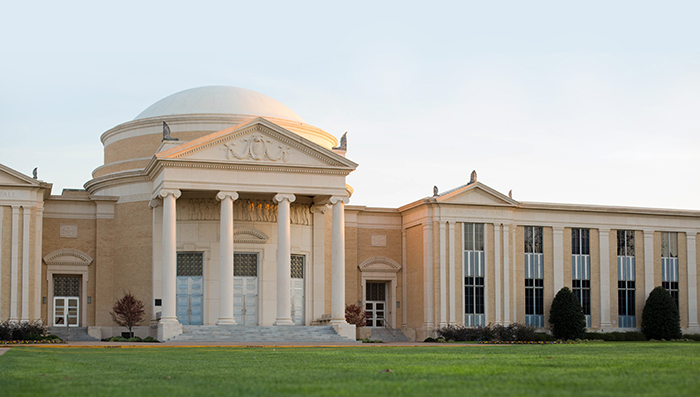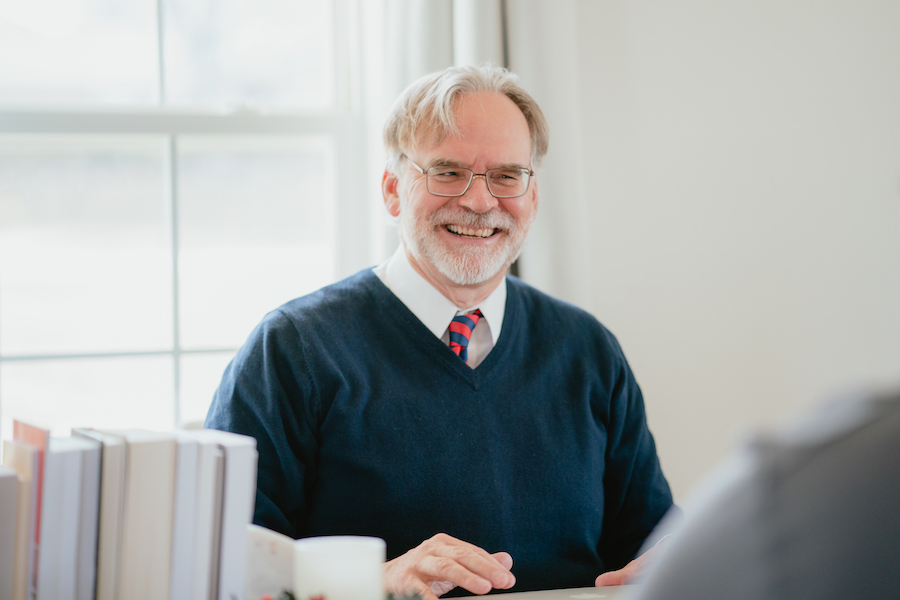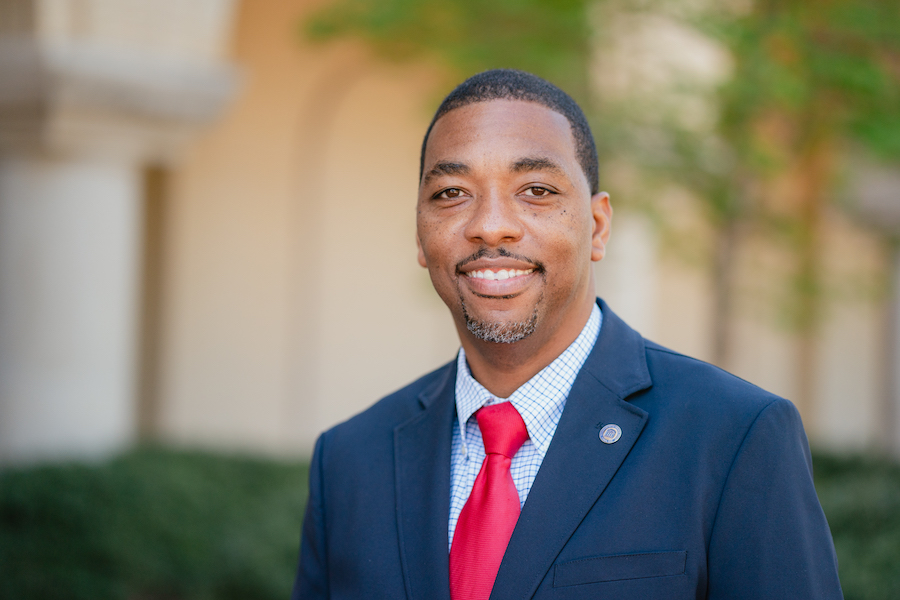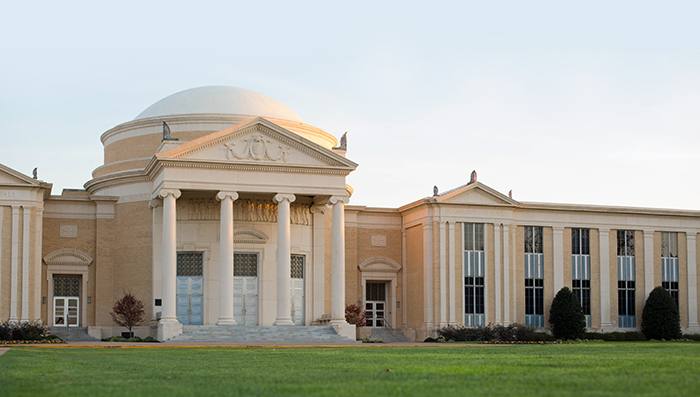Copeland has ‘hands on both sides of the map’ from Seminary Hill
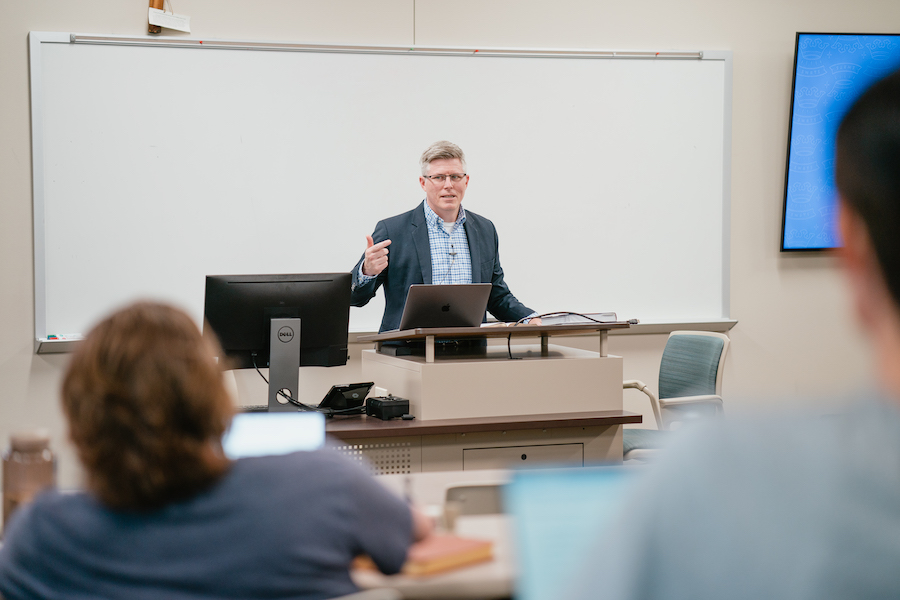
The opportunity to “have hands on both sides of the map” is what Michael Copeland heard in the spring 2022 when he was contacted about serving at Southwestern Baptist Theological Seminary as assistant professor of missions and associate director of the World Missions Center.
Alongside his family, Copeland had been serving as a missionary with the International Mission Board in Central Asia. However, the potential to serve at Southwestern was “flabbergasting” because it was “like somebody had said, ‘Would you like to do the thing that you’ve been dreaming about doing for the last 10 years?’” he recalled, adding he was “convinced” teaching and mobilizing, as well as serving overseas was “impossible.” Yet, the desire God put in Copeland’s heart in 2012, and the ways He had been ordering his footsteps since high school, was becoming a reality.
Born in Houston, but raised in the northeast Oklahoma town of Bartlesville, Copeland remembered his family began to attend a Methodist church in town. Though he “fell off” attending following middle school, he explained the church’s youth group was “very evangelical” though “the church was not.” At the prompting of the church’s youth pastor, Copeland began to attend the church again in high school.
“I thought everything about morality at that point or about relationship with the Lord was to figure out what you needed to do in order for God to fix it,” Copeland recalled. “And so I started going to youth group just because I was kind of interested, but everything came to a head. The Gospel was presented multiple times, though I didn’t really hear it.”
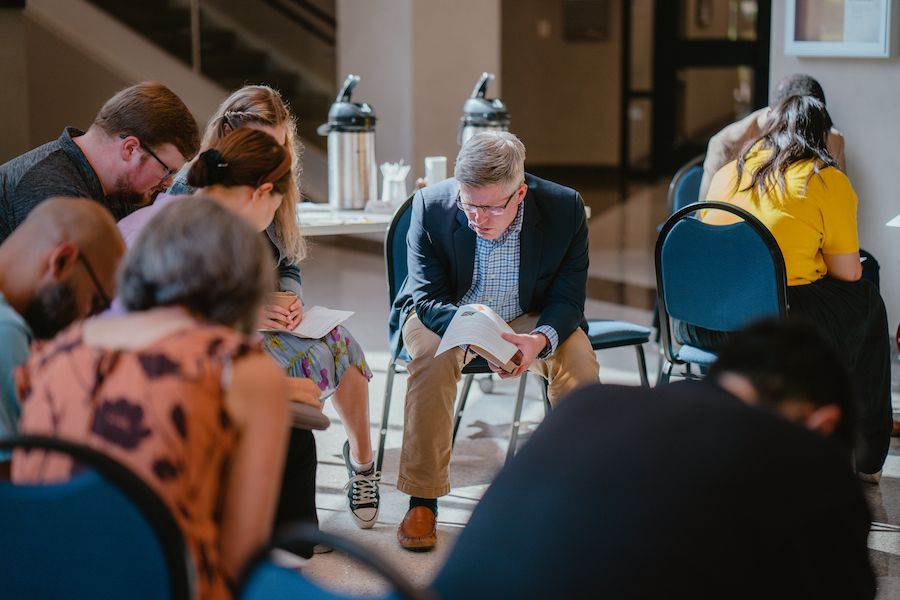
Michael Copeland, assistant professor of missions and associate director the World Missions Center at Southwestern Seminary, has served at his alma mater since Aug. 2022. Using his 15-year missionary experience with the International Mission Board, Copeland teaches students the biblical basis of missions and the practicality of living overseas.
Though he was not a leader in the youth group, Copeland said he asked the youth pastor for permission to attend a leaders’ retreat for the teenage youth group leaders. Before attending the retreat, an encounter with his local high school’s Christian math teacher and a classmate is when “conviction really started” and it was no longer about “me doing the right thing to get the right results from the Lord.” Copeland said before attending the retreat “anytime somebody said the name ‘Jesus,’ it would give me the willies” and it felt “uncomfortable.”
However, at the retreat, he saw “how other Christians act and how I wasn’t acting,” Copeland recollected. Simultaneously, he “continued to hear the Gospel over and over again … through real people’s lives and I just started finding joy in the idea of following Jesus and who Jesus was.”
The week following the retreat Copeland began reading a Good News Reader’s version of the Bible – specifically the Gospel of Matthew. He remembered it was the first time he opened up the Scriptures and it did not seem to be “one phrase after another” that was “disjointed.” Rather, he recalled, he “started becoming more and more amazed, especially when I hit the Sermon on the Mount.”
Copeland said that “Jesus was making sense and He was purposefully making sense.” As he read the Scriptures, he remembers he realized that he had “been living life up to that point, trying to find what was permissible and that’s what I had understood Christianity to be.” However, Copeland said the Lord was “telling” him as he was reading the Scriptures and “trying to understand what He’s talking about, that it’s not about what’s permissible; it’s about what’s most beneficial in knowing Him.”
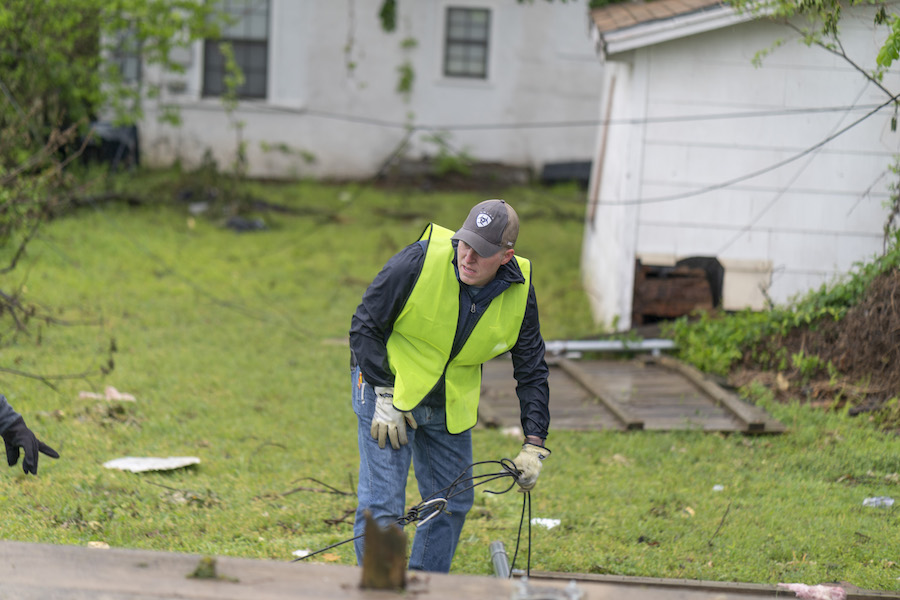
A graduate of Oklahoma Baptist University, Copeland traveled to the Shawnee, Oklahoma, campus in April to help clean up the campus alongside Southwestern Seminary students after a tornado destroyed buildings and property at the school.
As Copeland continued to read the Gospels that week, he said the Lord and the Holy Spirit began “bringing up” the other times he had previously heard the Gospel. Ultimately, he got down on his knees by his bedside and told the Lord “My life for you” which “meant I was acknowledging the exchange that He had given His life, died on the cross for my sins, defeating sin and death was resurrected” and that Christ was “exchanging” Copeland’s life for His “and in that was asking forgiveness for sins.”
From that point forward, Copeland was “discipled that you were supposed to go overseas.” So, following high school graduation, Copeland spent his summer on an overseas mission trip to East Asia. He said the experience was how he was “introduced to East Asia,” where he and his family would serve with the IMB later in life.
Copeland enrolled at Oklahoma Baptist University in Shawnee, Oklahoma, as a cross-cultural ministry major because “my mindset was on missions at that point.” During his time in East Asia, he saw what the Lord had done through different believers, while simultaneously “getting to engage in cross-cultural evangelism.” His passion for missions was furthered during a cross-cultural ministry class at OBU that was taught by Jeff Lewis, a 1983 Master of Divinity graduate of Southwestern. Lewis helped Copeland “have a better theological understanding of God’s sovereignty and His greatness as the center of missions” which made “the theological and biblical understanding of missions … a lot easier to grasp.”
Following graduation from OBU, Copeland and his wife, Jeani, whom he met in college, eventually moved to New Orleans where they both pursued graduate studies at New Orleans Baptist Theological Seminary. They left for the mission field in 2007, where they served Central Asian peoples who were living in East Asia through the IMB.
While the couple served overseas, they hosted college students who were on short-term mission trips. Much like others had helped shape his biblical theology of missions, Copeland was able to help the students understand God’s purpose for missions. He desired to “teach or spend time with students,” and during one stateside assignment was the missionary-in-residence at OBU. When the missions professor had to take a leave due to health issues, Copeland began teaching the professor’s five missions classes.
“At that time, I felt like ‘Oh, I’m supposed to be doing this,’” he remembered about his time teaching. “I didn’t feel like I wasn’t supposed to go overseas – that didn’t get taken away from me. But I was also supposed to do mobilization.”
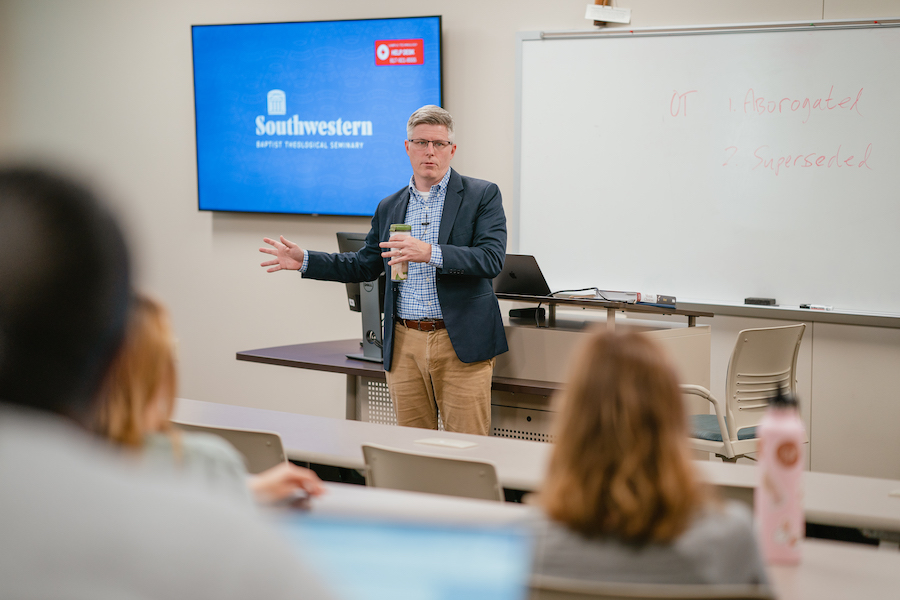
Students appreciate that Copeland “shares from his life” as he teaches Introduction to Missiology and Cross-Cultural Communications courses.
This realization led him to pursue a Doctor of Philosophy in World Christian Studies from Southwestern, which he completed in 2018. However, the academic leadership of the Roy J. Fish of Evangelism and Missions, which houses the World Christian Studies program, continued to ask Copeland to serve as the second and third reader on doctoral dissertations and the “Lord also kept giving me smaller opportunities to continue to teach.”
Copeland, who has served in the dual role since August 2022, teaches in the classroom, drawing from his education and mission experience, while also mobilizing students for missions in the classroom. Two of the courses he teaches, Cross-Cultural Communications and Introduction to Missiology, allow him to marry the theory and practicality of living and serving overseas.
Laura Pepper Franklin, a recent Master of Divinity with a concentration in missions graduate, gleaned from Copeland’s teaching and mission experiences when she took Cross-Cultural Communications in the fall 2022. Franklin, who is preparing to leave for the mission field to serve in South America alongside her husband, Jordan, a fellow MDiv graduate, appreciated the way Copeland would share from his life as he taught the course.
“He would use the material we were learning from reading and share a lot of stories about his life on the field,” Franklin explained. “That was one thing that I really appreciated as someone who [is] actually going on the field.”
Marvin Schaefer, a student in the five-year program at Texas Baptist College and Southwestern Seminary, agreed. Originally from outside of Frankfurt, Germany, Schaefer began studying at the Fort Worth institution more than three years ago and said he is able to apply what he learned in Copeland’s Introduction to Missiology class to his role as discipleship pastor at Fielder Church in Arlington, Texas.
The church is “a really multicultural, and multi-ethnic church,” Schaefer explained. “We have people from many different backgrounds and cultures and helping understand cultural paradigms and cultural backgrounds is so tremendously helpful even in their discipleship journey.”
Schaefer said as he creates curriculum and sermon-based lessons, he is “trying to keep in the back of my mind” that he needs to consider “questions to ask to contextualize” the material “to the different cultures that we have in our church that might benefit from that.”
Copeland invests in students outside of the classroom as “they go” as he gets to “sit next to students” alongside the staff of the WMC as they “do the things in action that would be very beneficial” to prepare students for the field or in ministry. But, Copeland gets to lead students in missions experiences, too, as he will take a team of students to Cambodia in October during Fall Break.
However, Copeland concluded, he finds the “most joy in spending his time investing in students.”
